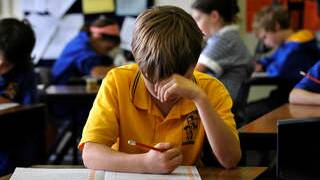Voice of Real Australia is a regular newsletter from ACM, which has journalists in every state and territory. Sign up here to get it by email, or here to forward it to a friend. Today's was written by Northern Beaches Review editor Kate Cox.
Subscribe now for unlimited access.
or signup to continue reading

SO which came first, the happy student ... or the good National Assessment Program Literacy and Numeracy (NAPLAN) results?
Let me explain.
Every year, as we head into NAPLAN (May 10 this year, for those of you with kids in Year 3, 5, 7, or 9); a multitude of research is released by a bunch of publicists.
Landing in my inbox in recent days: insurance research showing parents care more about NAPLAN because of the pandemic; a Department of Education press release announcing that, after a review, NAPLAN results will come out earlier (next year) and a think tank research paper arguing that spending lots of money on tutoring is not necessary for NAPLAN success.
Plus, a press release from the Australian National University and Gradient Institute, announcing that kids who are happier do better in test results. And, conversely, kids who are unhappy, do worse.
This paper is full of tiger-mum trigger words - NAPLAN, success, homework - but in the main argues that NAPLAN results are linked to far more than time spent on homework and that wellbeing has a "significant impact" on academic performance.
They came to this conclusion after studying 3,400 students, and learning that self-reported levels of depression had a large, negative effect on their NAPLAN results months later.
"This research has a far more wide-reaching effect than just NAPLAN tests, it shapes the way education professionals should approach teaching as a whole," study author Dr Diana Cardenas said.

"Our findings show that teaching for test scores isn't enough. There is great benefit when schools care about the head and the heart of their students.
"Subjective well-being - how a person perceives their emotions and experiences - is an under-explored area in education."
Which got me thinking. If happier students do better in NAPLAN, but the energy and hype around NAPLAN can stress students out, are we sabotaging our kids with this national academic data mine?
My advice, as a parent of two boys about to commence their third and fifth NAPLANs, is to embrace the opportunity. Think like all the publicists, marketers, researchers, media organisations and educational and government institutions: data is valuable.
NAPLAN data is not everything. But it's a useful tool for determining how your child, compared with the rest of Australia's children, is progressing in gaining the crucial life skills of literacy and numeracy.
Use the data to work with their teachers and school to help them reach their full potential, the same way you would use any other intel you can pick up from your kids.
Everything helps when, if they're anything like mine, information gets scarce as they get older ... and more comfortable with the one word response.
In case you are interested in filtering all the latest down to just one late afternoon read, why not sign up for The Informer newsletter?
MORE STUFF HAPPENING AROUND AUSTRALIA:
- Welcome to Disaster Country: Watch the sneak preview
- COVID reinfections surging but may never be traced
- Men stay fit at expense of working women
- With the UN powerless, the greatest danger now may be Russia beginning to lose in Ukraine
- Regional health crisis: women in labour forced to drive 40 minutes away to give birth
- Out of this world: 'Star Trek house' up for grabs
- Woman 'aimed for the stars' to become world-renowned astronomer
- The real dirt on carbon farming


